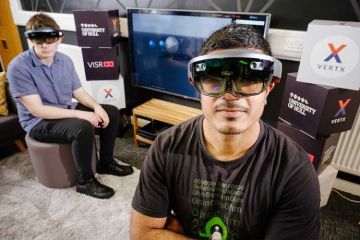Friday.
Clutching two heavy cases, I run to catch a bus. These are my last few minutes in Trieste, a beautiful coastal town in northeast Italy. In ancient times it was a meeting place for peoples of Venetian, Istrian, Gallic and Celtic origin. But for the past four days it has been host to myself and hundreds of other scientists discussing the mathematical complexities of, for example, computers that recognise speech and electronic neural networks that mimic brain behaviour. The information society has an unstoppable momentum.
I (modestly) help it develop, while my colleagues in communication studies attempt to analyse it. Now however, I have to get to the University of Sarajevo - beginning with a three-hour bus journey from Trieste to Rijeka in Croatia.
Saturday
I awake at 6am aboard the ferry Marco Polo. Ten hours after leaving Rijeka we have arrived in Split on the Croatian coast. I accept a quayside offer of a Pounds 15 per night private room, rather than a hotel at Pounds 55. But my host's kind suggestion of a schnapps at 6.30am is too early - even for me. Spend the day reading and sightseeing. Meet a young Croatian soldier, who chain-smokes while telling me that he is wanted by the war-crimes tribunal in the Hague. He says Split has a heroin epidemic.
Sunday
It is 7.30am at the port. An elderly woman nearby tries to let a room to three Australian backpackers. "No thanks," they reply, "We're off to Venus." She looks speechless. So do I. Perhaps it is "Venice" with an Aussie accent? At 8am my bus leaves. We follow the Croatian coastline down to Polce, and then head northeast along the Neretva river winding through deep valleys in Bosnia proper. In Croat-controlled "Herzeg-Bosna", we often go for miles without seeing a house intact. All are burnt out, blown up or pockmarked with bullet holes, evidence of the scale and savagery of "ethnic cleansing". Entering the Muslim sector of the medieval town of Mostar the destruction is now almost total. Here the famous 400-year-old white cobalt bridge, symbolic of the very multi-ethnic idea of Bosnia and Herzegovina itself, lies in ruins after a sustained artillery attack by Bosnian Croat forces in 1993.
At 4pm I arrive in Sarajevo to be met by my host Sead Kreso from the faculty of electrical engineering at Sarajevo University. My accommodation is a room in a private flat with ubiquitous UNHCR plastic sheeting for windows - there are only two hotels left operating, and these are both full.
Monday
My landlady gives me breakfast. She speaks no English but has a Serbo-Croat/English phrase book and so we both point to what we want to say to each other.
Walking outside, the scale of destruction is unbelievable. After a three and a half years siege by Serbian forces, and the indiscriminate dropping of two million bombs, not a single building has escaped damage. Sarajevo is now a city of foreign personnel and acronyms (UNPROFOR, I-FOR, UNHCR, OSCE, IRC, WUS), intermittent water supplies and a 11pm to 5am curfew. But despite all this, parts of the centre exude a relaxed cosmopolitan atmosphere with packed cafes, restaurants and music playing.
I give a four-hour lecture on digital signal processing in communications to university staff and officers in the Bosnian army.
Tuesday
Another four hours of lecturing. My lecture room also has plastic sheeting for windows and is "decorated" with shrapnel marks and bullet holes - a reminder of the bravery of the staff and students who resolutely kept the university open throughout the siege. Have lunch at a restaurant with Sead and the dean, Professor Pasic. We talk about the war, religion, politics, and the future. (Being Irish, I now feel in my element.) The Bosnian army was so starved of resources that each soldier received only 20 bullets per day, and then had to write a report on those used.
Wednesday
It is with great sadness that I leave Sarajevo, but I make genuine promises of practical support. Another eight hours in the bus, and I am back in Split again. Have coffee with two anxious teenagers - he Croat and she Muslim. Tonight they are leaving for a new life in the Bronx. They do not know the Bronx. I say nothing. Why spoil things? I catch the ferry to Rijeka.
Thursday
By air from Trieste to London. On the train back to Leeds I daydream about government cutbacks, efficiency gains and a 1.5 per cent pay offer. But the parting words of Dr Kreso ring in my ears: "For three-and-a-half years we were under siege by Serbian forces. Twelve thousand civilians were killed in Sarajevo alone. We had virtually no food, water, heating, gas or electricity. But we survived. This year I feel better than last year. Next year I will feel even better than this. So I am happy."
Lecturer in signal processing and communications, department of electronic and electrical engineering, University of Leeds.
Register to continue
Why register?
- Registration is free and only takes a moment
- Once registered, you can read 3 articles a month
- Sign up for our newsletter
Subscribe
Or subscribe for unlimited access to:
- Unlimited access to news, views, insights & reviews
- Digital editions
- Digital access to THE’s university and college rankings analysis
Already registered or a current subscriber? Login







